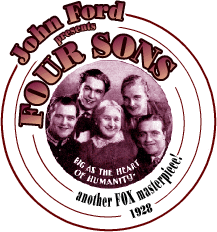

Produced by: Fox
Cast: Margaret Mann (Mother Bernle), James Hall (Joseph Bernle), Francis X. Bushman, Jr. (Franz Bernle), George Meeker (Andrea Bernle), Charles Morton (Johann Bernle), Earl Foxe (Major Von Stomm), Albert Gran (postman), Frank Reicher (schoolmaster), Hughie Mack (innkeeper), August Tollaire (burgermeister), June Collyer (Annabelle), Leopold, Archduke of Austria (German captain), Robert Parrish (Joseph's son)
Prior to World War I, Mother Bernle and her four grown sons are living a happy, peaceful life in a small Bavarian village. The oldest son, Joseph, yearns to go to America to live, and his mother gives him her savings to realize his dream. Soon afterwards, the war begins, and two of the sons go off to battle. Both are killed, leaving the youngest son, Andreas, with his mother. Meanwhile, Joseph becomes an American citizen and joins the army to fight against Germany. The evil Major Von Stomm comes to Mother Bernle's house one rainy evening to rebuke her for having a son who is a "traitor" and takes the young Andreas away to join his battalion. Andreas is killed in battle, dying in brother Joseph's arms. After the war, Joseph goes back to his wife, child and successful restaurant in New York and sends for his mother to come live with him.
"Millions wept over 'Four Sons' (1928), while Fox cheered the 'Biggest Success in Last Ten Years' and I.A.R. Wylie, struck by the 'restraint' with which her story had been filmed, praised the 'simple, half-completed gestures and the commendable absence of tears.' Photoplay voted it best film of the year." This is from John Ford: The Man and His Films (University of California Press) by Tag Gallagher and only gives some hint of what a great film "Four Sons" is.
Respected silent film historian William K. Everson said
"Four Sons" was one of a number of "permanent classics
of the American Screen." Variety said, "As an
artistic creation, the production is magnificent in the amazing
effectiveness of its fine realism and in its utter simplicity."
From every corner, high praise was heaped upon "Four Sons"
at the time of its release, and in particular upon the performance
given by Margaret Mann as Mother Bernle. In addition, "Four
Sons" was an enormous success at the box-office, reportedly
Fox's largest grossing film up to that point. In a 1966 interview,
director John Ford said, "Strangely enough, it became 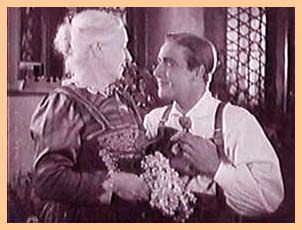 one
of the biggest money makers ever made. It still holds the attendance
record at the Roxy, which was one of the biggest theatres in the
world. Of course, other pictures have outgrossed it because the
admission prices were much lower in those days -- a quarter instead
of two dollars. I like that picture very much."
one
of the biggest money makers ever made. It still holds the attendance
record at the Roxy, which was one of the biggest theatres in the
world. Of course, other pictures have outgrossed it because the
admission prices were much lower in those days -- a quarter instead
of two dollars. I like that picture very much."
In spite of the artistic and financial success of "Four Sons," it has not been readily available for viewing to modern audiences. As of this writing, it has never appeared on videotape or DVD. Its one "large audience" showing was a few years ago when the cable TV channel America Movie Classics ran it during a month-long tribute to Fox silents. In 1978, Everson wrote in his book American Silent Film (Oxford University Press, 1978) that the "bulk" of Ford's silent work "has been missing for four decades. During that time, all that was available for general study (and only at archives, museums, and film societies) was his 1924 western epic "The Iron Horse," and "Four Sons" (1928) was known to exist and had one or two occasional showings at archives only. Thus, one of the most prolific (and formulative) periods of one of America's finest directors has been a virtual blank. . ."
"Four Sons" deserves to be brought back before the public and made available on home video to silent film buffs. The pre-recorded Movietone score with occasional sound effects survives and provides a perfect mood-setting accompaniment for the film. At one point, a song is inserted which is somewhat distracting, and at another point we hear the voice of a soldier calling for his mother through the fog-shrouded darkness (which is very effective). But, other than that, there is only an occasional sound effect - a bell, a hammer and anvil, a train. Ford and Fox wisely had enough faith in the film itself that a constant barrage of sound effects wasn't necessary to bring the audiences in.
1928 was possibly the peak year for silents in terms of technical quality, mastery of the art of acting in a silent drama and cinematography. "Four Sons" is an excellent example of the zenith that silent film had reached in this year and certainly would be more universally considered among the great films of the silent era if it had had the proper exposure over the years.
Ephraim Katz in The Film Encyclopedia (Thomas Y. Crowell, Publishers, 1979) said, "Ford directed two important silent films, 'The Iron Horse' (1924) and 'Four Sons' (1928)." When referring to Ford's "best" silent films, Peter Bogdanovich refers to three. In John Ford (University of California Press, 1978), he says, "Rarely did he have the opportunity to do projects of his own choosing, and it is interesting that when he did, they were not only his best films, but also his most successful: The Iron Horse, 3 Bad Men, Four Sons." The Paul Killiam edition of "Three Bad Men" was available for awhile on video, but has since been withdrawn. "The Iron Horse," although probably the most widely seen of the three, is regrettably unavailable on the home video market, as well.
"Four Sons" is without question a film that oozes sentimentality, but therein is its appeal. Ford found the story by I.A.R. Wylie in the Saturday Evening Post and, in addition to enlarging it to feature film length, controlled the sentimentality so that we get a full dose, but not so much that it is sickening or maudlin. Much was made in the 1928 press about Mann's acting restraint, particularly when the announcement arrives that she has lost two of her sons in battle. No tears were shed. Instead, after Andreas reads her the letter, she is obviously shocked by the news, her body stiffening, then jerking slightly. She puts her hand to her head, turns and leaves the room full of people. She goes to her bedroom and sits in a chair beside the bed. Ford handles this scene extremely well as we see Mother Bernle in a long shot beside the bed, a shaft of light streaming through the window on her. The sparsely furnished room, bare walls and Mann's distance from the camera elicit a sense of loneliness. We then see the bell tower and the bells ringing. The postman walks to the river's edge, head hung down and throw a rock into the water watching the circles gliding outward from the splash. A most effective means of conveying the emotion without wild histrionics.
Variety said, "Mrs. Mann's playing of the big role is a miracle of unaffected naturalness. Her Frau Bernle lives from the moment the film starts to its finish. She looks the part and she plays it with utter absence of effort or consciousness as a stately and white crowned old mother might go about her household tasks." The New York Times reviewer said, "Mrs. Mann is excellent in her portrayal of Mother Bernle. She looks courageous. She appears to be bearing up in the face of great sorrow, and latterly she seems much too exhausted to fight anymore. It is an extremely difficult role for an elderly woman, especially before a camera. Yet Mrs. Mann has succeeded in looking as if she were living the part."
As a side note, The New York Times review gave a brief account of Mann's appearance at the New York premiere of "Four Sons." "After the screening of the picture, there was a dramatic few minutes when Mrs. Margaret Mann was introduced by Courtland Smith. Mrs. Mann is 60 years old. She impersonates Mother Bernle in the story. She, it seems, worked for ten years as an extra, and her first chance for fame came when Winfield R. Sheehan, general manager of the Fox Studios, chose her to act the principal role in this film. Mrs. Mann was obviously affected when called upon. She is a charming lady who gives an astoundingly competent performance as the German mother."
Although the above review credited Sheehan as selecting
Mann for the role. Ford claimed the Fox executives wanted a name
that would be a bigger draw at the box office such as Louise Dresser
or Belle Bennett; however, Mann had done some extra work for Ford
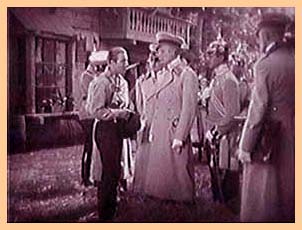 in
the past, and he felt she would be perfect for the role. Supposedly,
when the Fox executives saw her screen test, they agreed.
in
the past, and he felt she would be perfect for the role. Supposedly,
when the Fox executives saw her screen test, they agreed.
Side note: For those who are familiar with the early Our Gang/Little Rascals shorts, Mann was Mrs. Mack (the store owner) in "Helping Grandma" (1931) and the grandma in "Fly My Kite" (1931).
James Hall, as the oldest son, Joseph, has the second lead in the picture, and is the only one of the sons to survive at the end of the story. He, too, exhibits restraint and naturalness in his role. An example of this restraint comes early on in the film. As we are being introduced to the four sons at the beginning, Joseph is returning with a wagonload of hay. As he passes Von Stomm on the street, some of the hay falls on the major infuriating him. Joseph jumps off the wagon and brushes the hay from Von Stomm's coat, even kneeling down to brush it away from his boots while apologizing. As Joseph stands, he is slapped by Von Stomm, who walks away. We can see the anger in Joseph's eyes, but the anger is conveyed without excessive facial contortions or gritting teeth. Variety liked Hall's portrayal. "The picture will be the making of James Hall, hitherto just a young leading man. As Joseph, he creates a splendid portrait with a wide range of clean cut playing." The New York Times, never one to "gush," said, "James Hall is quite good as Joseph."
Earl Foxe's characterization of Major Von Stomm is the only acting that could possibly come under some criticism because he gives us a caricature of the stereotypical German officer, a la Erich Von Stroheim (note some similarity to Von Stomm, the name of Foxe's character?) However, it could be that nothing less would do for audiences as Foxe was expected to give us a truly despicable character whose death would be welcomed in the film. Also, the slapping episode with Joseph is supposed to have given him some impetus for enlisting in the American army later on in the film, another reason to make Von Stomm as "nasty" as possible. There certainly is nothing original about Foxe's portrayal -- the stiff posture, bending at the waist, monocle held firmly in the eye, cigarette at the end of a cigarette holder, the baring of the teeth. However, there is one scene where Foxe is certainly at his most effective.
On a rainy night, Von Stomm and his soldiers arrive at Mother
Bernle's. She had already lost two sons in the war, and the young
Andreas is the only one at home. Von Stomm and his officers barge
in. He questions her about Joseph and his serving in the American
army, calling him a traitor and her the mother of a traitor. He
uses his riding crop to lift her chin to look at him as he says,
"What right have you to eat your country's food and burn
your country's oil? Must I fight and starve for you -- you, the
mother 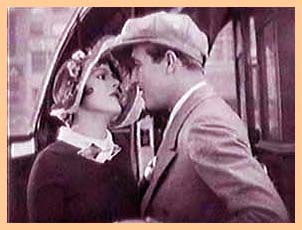 of a traitor?" Then, the scene really become gut
wrenching as Von Stomm orders Andreas to report to the barracks,
and Mother Bernle begs him to let Andreas stay.
of a traitor?" Then, the scene really become gut
wrenching as Von Stomm orders Andreas to report to the barracks,
and Mother Bernle begs him to let Andreas stay.
Although carrying much smaller roles, Francis X. Bushman, Charles Morton and George Meeker generally received good reviews for their acting, as well. Albert Gran as the postman, Frank Reicher as the schoolmaster, Hughie Mack as the innkeeper, and August Tollaire as the burgermeister, do a good job of adding a German flavor to the film, and even some mild humor. Gran is particularly good when, on two occasions, he must deliver the dreaded letter announcing the death of a son to Mother Bernle. The lovely June Collyer as Joseph's wife, Annabelle, also has a small role, but she is charming. It's only a shame her career didn't begin earlier in the silent era.
Of Ford's direction, Katz said, "Politically and socially, Ford may possibly best described as a populist; emotionally as a sentimentalist. . . Ford was a folk artist, a master storyteller, and a poet of the moving image." In Hollywood Directors 1914-1940 (Oxford University Press, 1976), Richard Koszarski said,
"Although John Ford was later to become the most honored of Hollywood directors (by film-makers as well as critics), his reputation in 1928 was modest at best. While he had proved himself a commercially responsible director, only two or three of his films had won more than passing notice . . . "
"Four Sons" certainly received more than passing notice in 1928, but, unfortunately, many latter-day historians want to gloss over Ford's success with "Four Sons," in acting style and cinematography, because of what they perceive as a desire to copy F.W. Murnau who had shook the cinematic world with his masterpiece "Sunrise" just prior to the making of "Four Sons." In An Evening's Entertainment (University of California Press, 1990), Richard Koszarski said, " . . . even those directors most closely associated with cozy Americana subjects, men like (Clarence) Brown, Frank Borzage, and John Ford, had absorbed the lessons of (F.W.) Murnau and his style. Ford actually shot much of 'Four Sons' (1928) right on the old 'Sunrise' village sets."
Everson implies some influence by Murnau, too. He said that "John Ford, whose basic influence came from (D.W.) Griffith, and who would return to a particularly strong recapitulation of Griffith themes and methods in his films of 1933-36, temporarily changes (and slowed) his whole style to match that of Murnau." Everson said Ford worked from an "uncredited, stream-of-consciousness screen treatment" for "Four Sons" by Herman Bing, a Murnau assistant who had also worked on the final shooting script of "Sunrise" (1927). Admittedly, Murnau's influence is difficult to repudiate in Ford's next film, "Hangman's House" (1928), which Everson described as "a very strange mixture of German-dominated visual stylistics reminiscent of 'Warning Shadows' (1922)."
Gallagher says the "ponderous pacing" of the film was very atypical for Ford at this time. "Each muscle movement is parsed with elaborate detail, as in Murnau's 'Last Laugh;' framings are high, as in Murnau; the script derives from a stream-of-consciousness treatment by Herman Bing, a Murnau assistant; and even the sets of the Bavarian village and New York are reused from "Sunrise" -- as in many other Fox films of the day (not surprisingly, considering the city street alone cost $200,000 to construct)."
Although there may be evidence of Murnau influence on Ford's
directing style in "Four Sons," this movie is a far
cry both visually 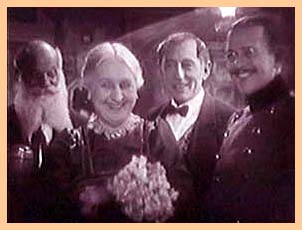 and in tone from
"Sunrise," and no one who has seen the latter and has
not seen "Four Sons" should expect a carbon copy film.
"Four Sons" and Ford's handling of the story is unique,
and this film can undoubtedly stand shoulder to shoulder with
the best to come out of the late silent period.
and in tone from
"Sunrise," and no one who has seen the latter and has
not seen "Four Sons" should expect a carbon copy film.
"Four Sons" and Ford's handling of the story is unique,
and this film can undoubtedly stand shoulder to shoulder with
the best to come out of the late silent period.
As noted earlier, "Four Sons" received virtually nothing but rave reviews when it was released. Variety said, "The film is an achievement in artless realism. There isn't a moment when it does not live, and the whole production is utterly guiltless of theatrical device." In Motion Picture Almanac exhibitors reported on the success of the film after being shown in their theatres. One said, "A positive knockout. Certainly a delight to play such an attraction. Fox surely has the pick of pictures. (Egyptian Theatre, Ogden, UT.) Another commented, "A picture that ranks high in entertainment and universal satisfaction. You can give this some extra advertising and not be afraid to stick around the lobby when the show is over." (H&S Theatre, Chandler, OK.) Still another, "Good drawing card and a fine picture in every sense. (New Piedmont Theatre, Oakland, CA.) And another commented, "Not only one of the greatest of 1928, but can be included among the greatest ever produced. Direction and acting well nigh perfect, and the story was good. No complaints were heard - nothing but praise. Margaret Mann's portrayal of the mother and her charge, through misfortune, from a happy old lady to an old woman whose shoulders were heavily laden with sorrow, was excellent. She deserves a niche in the screen Hall of Fame. (Amuse-U Theatre, Melville, LA.)
Ford recounted a humorous anecdote about the filming of "Four Sons" in a 1966 interview with Peter Bogdanovich. Ford said John Wayne was an assistant prop man on the film. In one scene, when Mann received word of the death of her son, she was to break down and cry. "It was autumn," Ford remembered. "The leaves were falling, the woman sitting on a bench in the foreground -- a very beautiful scene." After two or three tries, he said they were finally getting a perfect take when all of a sudden Wayne appears in the background sweeping leaves. When he looked up and realized the camera was turning, he ran for the gate. Ford said they all laughed so hard, they had to call of shooting for the day. "It was so funny -- beautiful scene and this oaf comes in sweeping the leaves up. He still remembers it."
copyright 2003 by Tim Lussier. All rights reserved.